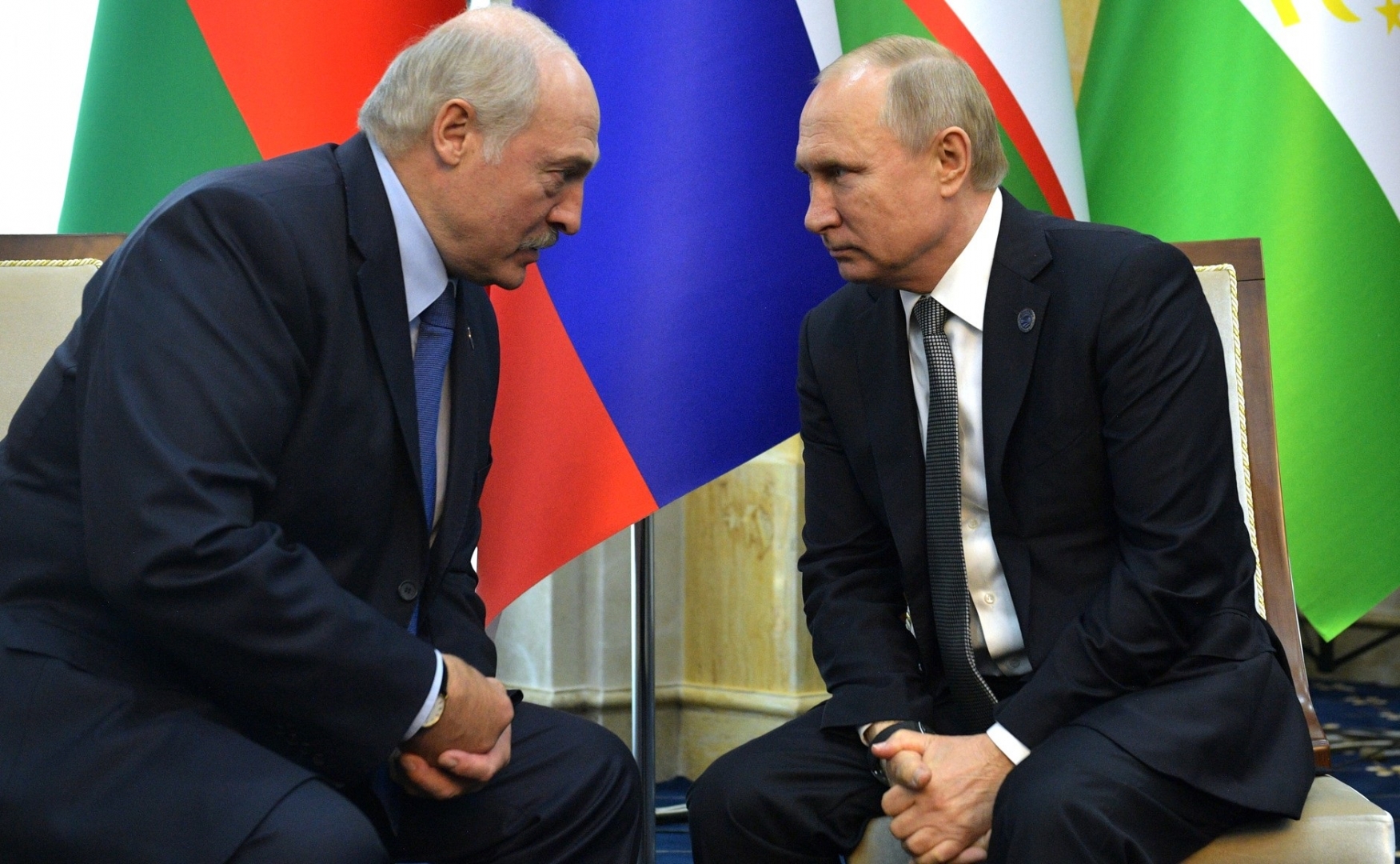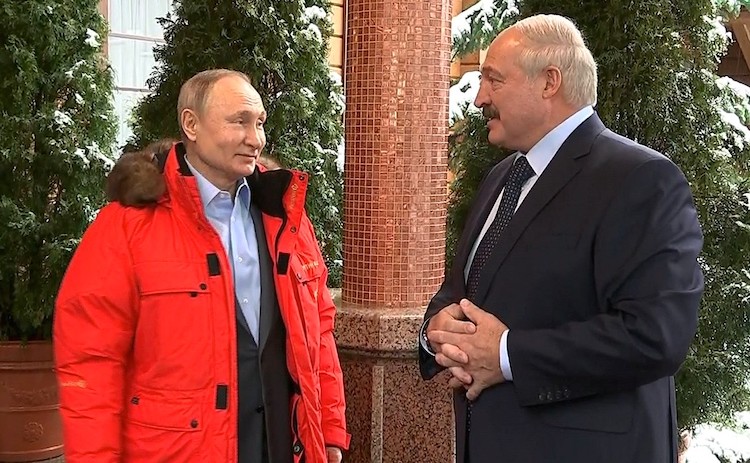Milinkevich: West and Russia may replace Lukashenka

Alyaksandr Milinkevich at the Euroradio studio
On the eve of the 2020 election, Alyaksandr Milinkevich warned that Russia had always been profitable if Belarus had a row with the West.
It is easier for it than to exert itself and stake on a pro-Russian candidate during the elections. The more the West pushes the idea of democratization of Belarus, the more resolutely Lukashenka turns to the East and is forced to integrate closely with Russia.
We spoke with the politician, united opposition's candidate at the 2006 presidential election, about the "hand of Moscow" and the possible consequences of the new sanctions against Belarus.
The Kremlin has a combo - three goals out of three achieved
Euroradio: Right now, the relations between Belarus and the West are the worst they have been in many years. Do you see Moscow behind it?
Alyaksandr Milinkevich: It is considered bad manners among democrats to talk about the hand of Moscow. People say, "Ew, this is a conspiracy theory based on our complexes." It is painful for me, and I will never agree with this point of view. The Kremlin certainly does not decide everything in Belarus. But Moscow has a vast interest, resources, and experience.
The threat to our country's independence today is as severe as ever. And the plane [Ryanair. - Euroradio] has something to do with it, too. After Ukraine has permanently withdrawn from the candidates for joining the "Russian world," Russia has nothing left but to work to cast the net of this concept on Belarus. Thus, it has become a crucial country for Putin to brag about and tweak his rating, demonstrating the success of the process of returning the prodigal children to Moscow's dominion.
In this sense, Belarus is of particular enthusiasm to the Kremlin.
Since 2001, Moscow has always had several objectives for our presidential elections. Among them, there are three main ones. One is to set Belarus against the West. The second is to divide the demopposition. And the third one is to weaken Lukashenka in order to integrate him more quickly and deeply. And depending on circumstances, the Kremlin always has several scenarios to implement these objectives.
As a result of the last election, it turned out that all three objectives have almost been achieved. Relations with the West are completely ruined. Although the opposition has not been destroyed, it will not go out in droves. The price of these marches is extremely high, and it is not necessary at this stage to call on the Square. And Lukashenka is weakened as never before.
He is as isolated as possible. He has no choice but to ask the Kremlin for support. Both morally and financially.
Euroradio: But close integration with Russia due to the quarrel with the West has been predicted for years. So far, it hasn't happened. Why?
Alyaksandr Milinkevich: For us, for the democrats, the chance to influence Lukashenka's state policy is very slim. We have to think about what depends on us. The fact that a beautiful civil society of such power, such consolidation, such faith in ourselves has emerged is an outstanding achievement, our massive success in fighting for independence. Our civil society has even become the main subject of Belarusian politics. Today, we have sincere and robust support of the democratic world.
Lukashenka is not a guarantor of independence, but he does not need integration to take away his power. But he continues to play the notes that are pleasant for Moscow. This rhetoric has always worked. It helped him receive subsidies, loans and sell our not always up-to-date goods to Russia.
But today, there is growing frustration in the Kremlin. Instead of rhetoric, Putin wants specifics - recognition of Crimea, South Ossetia, and Abkhazia and constructing a military base in Belarus. Talks about integration are no longer lulling. Moscow seems determined to have changes. Not in Russia - in Belarus.
Russia may suggest to the West: "Let's replace him."
Euroradio: How has the situation changed after what happened to the Ryanair flight?
Alyaksandr Milinkevich: I do not rule out that Russia helped or even played a role in this operation. And now Moscow may try to use the results and try to negotiate with the West to improve its relations.
Lukashenka is no longer just a "bad guy" but an unruly person for Brussels and Washington. The moment is opportune, and the Kremlin may express to the "collective West" a new opinion: we, too, are tired of him, it is impossible to cooperate with him, he is unmanageable, he should be replaced for the security of the region. And I do not rule out that the West could say: we agree. You have more influence tools there. Let’s try for a bright future.
And suppose Moscow starts the procedure of Lukashenka's replacement. In that case, it will certainly do it through managed transit and, possibly, using the new Constitution, put a man who will satisfy it. He will probably release political prisoners and carry out liberal economic reforms. It's the wrong time for open annexation. It does not mean that such a person would immediately sell Belarus to Russia. But this will, of course, be a Moscow-centric person. For the Kremlin, the main thing is that he will not go to either NATO or the European Union.
At the next meeting in Germany, Biden and Putin will discuss common interests, where the Kremlin host will have to demonstrate that an offended Russia can be useful to the West in dealing with the annoying, loud problems in the spotlight of the world media.
Euroradio: It turns out the new sanctions are beneficial to Moscow. But what else could the West do to turn the situation to the advantage of Belarus, rather than a third state?
Alyaksandr Milinkevich: the West imposes sanctions to punish what it considers evil and strengthen security in the region. And the Kremlin is uncorking the champagne at this point.
Domestic and foreign policy is increasingly leading to destabilization. And the civilized world saw the story with the plane as an act of state terrorism. Europe has enough problems, and here Belarus may become another strong bifurcation point.
We must have no illusions: in the democratic world, politicians, and deputies of all levels, first of all, think about their countries, about satisfying the interests of their people—those who elect them. Democracy in Belarus is not their primary goal.
They reasonably believe that the Belarusians themselves should stand up for their right to live in freedom. Nonetheless, the West consistently promotes democracy in former Soviet republics, as only democracy provides stability, predictability, cooperation, and integration.
They do not have many tools to improve human rights and the rule of law in our country. More often than not, sanctions are essentially moral condemnation: you are disrespectful, we don't want you to visit us, so you won't get visas.
Euroradio: What about economic sanctions?
Alyaksandr Milinkevich: I am one of those people who believe that personal sanctions should be used as widely as possible. One should think ten times about economic sanctions.
We think: Lukashenka is terrible, while the West is our partner. Therefore, let them punish Lukashenka for his bad behavior. But experience shows that even complete isolation does not lead to a democratization of the regime. Typical examples are North Korea and Cuba. And in Korea, they eat grass from hunger. But the administration holds on, and it always has enough.
And in our case, there is an additional danger. We think that sanctions will help to change a dictatorship into a democracy. But when we say, "Let's have sanctions!" one has to wonder whether we are increasing the already enormous possibilities of an aggressive Moscow. Yes, we are. More and more experts see that by fighting for democracy in Belarus, you can lose your country. So we have no right to forget about our independence.
We need to remember our eastern neighbor, which, due to megalomania and inferiority complexes, is dreaming about the rebirth of its empire.
When I am figuring something out in the foreign policy, I always ask myself: is it beneficial for Moscow, implementing a policy of creeping annexation? I ask myself this question when I choose whether to oppose or support something. Independence can be lost overnight. And there's no telling when it will come back. And democracy will happen anyway - sooner or later - because it is a law of nature.
I say the words that are unpleasant to some. But, don’t doubt, I love democracy and freedom, but we must be successful strategically, not tactically.
"It's time to reclaim this land for ourselves."
The Ryanair incident is likely to benefit Russia by pushing it on Belarus. Putin will use this as a wedge to drive into relations between Belarus and the West. This is the opinion of the director of Eurasia Group consulting company Emre Peker. The company is engaged in forecasting of political risks in Europe.
Matthew Sherwood, a senior European analyst of the Economist Intelligence Unit, says the same in other words: "We don't expect the new wave of Western sanctions to have any real impact on the domestic situation. They might bring Belarus even closer to Russia".
European experts have never been afraid to be conspiracy theorists and look for the hand of Moscow everywhere. And maybe they are right. After all, while the Kremlin chooses restrained wording for comments on the landing of the Athens-Vilnius flight in Minsk, Anton Krasovsky of the Russian TV channel RT does not mince words and quotes Boris Grebenshchikov: "It's time to return this land to ourselves."



















